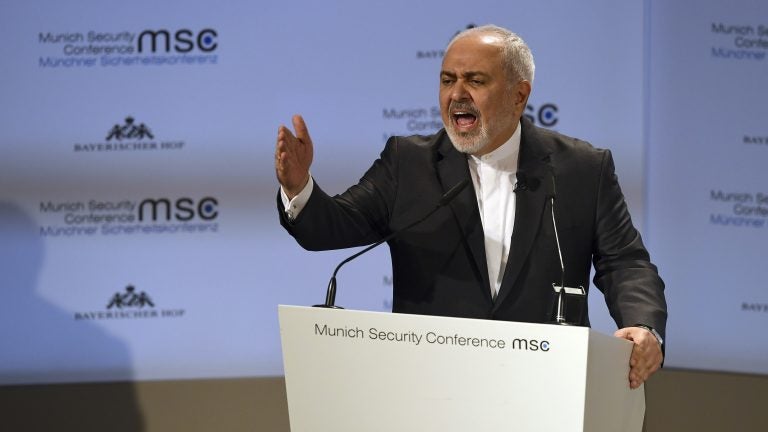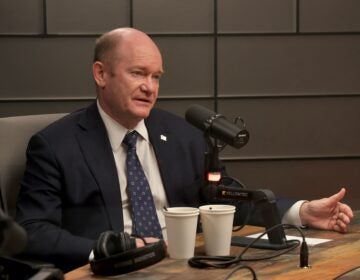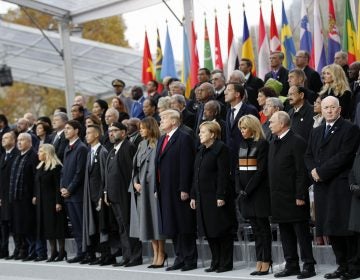Iran pressures Europe to do more to save the nuclear deal
Angela Merkel's comments at the Munich Security Conference followed days of acrimony between the U.S. and Europe over Iran.

Iranian Foreign Minister Mohammad Javad Zarif speaks during the Munich Security Conference in Munich, Germany, Sunday, Feb. 17, 2019. (Kerstin Joensson/AP Photo)
Europeans need to do more than talk if they want to preserve a deal meant to keep Tehran from obtaining a nuclear weapon after the unilateral withdrawal of the United States, Iran’s foreign minister said Sunday, slamming Washington as the “biggest source of destabilization” in the Middle East.
Mohammad Javad Zarif told a gathering of world leaders, top defense officials and diplomats that a barter-type system known as INSTEX, which was set up last month by France, Germany and Britain to allow businesses to skirt direct financial transactions with Iran and thereby evade possible U.S. sanctions, is not enough.
“Many around the world, particularly on this continent, speak eloquently about multilateralism, but they also need to walk the walk,” Zarif told the Munich Security Conference in an impassioned address. “INSTEX falls short of the commitments by (European countries) to save the nuclear deal. Europe needs to be willing to get wet if it wants to swim against a dangerous tide of U.S. unilateralism.”
The three European nations, as well as Russia, China and the European Union as a whole, have been struggling to save the 2015 nuclear deal with Iran since President Donald Trump announced a unilateral American withdrawal from it last year and re-imposed sanctions on Iran.
The deal promises Iran relief from sanctions in exchange for limiting its nuclear program, and so far the International Atomic Energy Agency has said that Tehran has been living up to its obligations.
Those working to preserve the agreement have been trying to walk a fine line between mollifying Iran without angering Washington. Zarif’s comments appeared directed at European assurances that INSTEX could concentrate on products not currently subject to U.S. sanctions, such as medicine, medical supplies and agricultural goods, rather than on broader trade.
On Saturday, U.S. Vice President Mike Pence slammed INSTEX and urged others to abandon the nuclear deal entirely.
“The time has come for our European partners to stop undermining U.S. sanctions against this murderous revolutionary regime,” Pence said before leaving Germany. “The time has come for our European partners to stand with us and with the Iranian people, our allies and friends in the region. The time has come for our European partners to withdraw from the Iran nuclear deal.”
Before Pence spoke, German Chancellor Angela Merkel defended the Iran deal, saying while she shared concerns about Iran’s missile program and its regional ambitions, it was important to keep “the small anchor we have (with Iran) in order maybe to exert pressure in other areas.”
Merkel’s comments, and her defense of global diplomacy instead of a go-it-alone foreign policy, drew lengthy applause.
Zarif told the conference that Pence had “arrogantly demanded that Europe must join the United States in undermining its own security and breaking its obligations” and urged them to push back against American pressure.
“If the United States were to come, in the course of their fight with China, and tell Europe to stop dealing with China, what would you do?” he asked. “Whatever you want to do then, do now, in order to prevent that eventuality.”
He would not comment on whether the nuclear deal will survive without the U.S. but said Iran was not prepared to renegotiate it as Trump has suggested.
“Nothing can be done that is better than this deal,” he said. “It’s not all we want and it’s certainly not all the United States wants but it’s the best that can be achieved.”
Responding to Pence’s comments that Iran was the “greatest threat to peace in the Middle East,” Zarif said the U.S. had an “unhealthy fixation” with Iran and was itself the “single biggest source of destabilization in our neighborhood.”
“The U.S. claims … that it is Iran which is interfering in the region, but has it ever been asked whose region?” Zarif said. “Just glimpse at a map for a second — the U.S. military has traveled 10,000 kilometers to dot all our borders with its bases. There is a joke that it is Iran’s fault that it put itself in the middle of all (the) U.S. bases.”
Zarif also accused the U.S. administration of looking for regime change in Iran — something Washington denies — and said Israel was “looking for war” with “violations of Lebanon’s air space and shooting into Syria.”
“The risk (of war) is great, but the risk will be even greater if you continue to turn a blind eye to severe violations of international law,” he said.
Benny Gantz, a former Israeli military chief and Israeli President Benjamin Netanyahu’s primary challenger in the upcoming April election, responded in a separate forum, slamming Iranian aggression in the region.
“On my watch, there will be no appeasement (of Iran). On my watch, Iran will not threaten Israel by taking over Syria, Lebanon or Gaza strip,” he said. “On my watch, Iran will not have nuclear weapons.”
Gantz told the audience, speaking of Zarif: “do not be deceived by his eloquence. Do not be fooled by his lies.”
The Munich Security Conference is an annual gathering of world leaders and defense and foreign policy officials.
___
Geir Moulson in Berlin contributed to this report.
WHYY is your source for fact-based, in-depth journalism and information. As a nonprofit organization, we rely on financial support from readers like you. Please give today.




